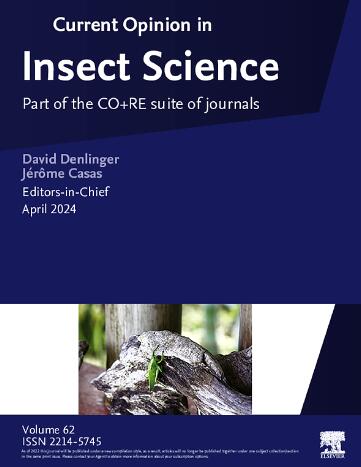人类活动对寄生蜂对非洲入侵害虫物种进行生物控制的影响。
IF 4.8
1区 农林科学
Q1 BIOLOGY
引用次数: 0
摘要
可持续农业对于确保粮食和营养安全以及改善非洲数百万人的生计至关重要。然而,农业生产受到本地害虫和入侵害虫的制约。滥用杀虫剂往往是治理这些害虫的第一道工序,不仅损害人类和动物的健康,还会影响生物多样性。因此,转而使用更具生态可持续性的替代品是保护生物多样性和可持续农业的关键。生物防治是害虫综合治理(IPM)战略的核心组成部分,寄生蜂等天敌被认为是最具环境可持续性的害虫治理手段之一。然而,人类世对这种方法的成功和可持续性起着重要作用。因此,我们在此探讨了人类活动的影响、寄生蜂作为入侵害虫生物控制剂的应用范围以及目前非洲利用寄生蜂的趋势。本文章由计算机程序翻译,如有差异,请以英文原文为准。
Anthropogenic influences on parasitoid wasps’ biocontrol of invasive insect pest species in Africa
Sustainable agriculture is crucial to ensuring food and nutritional security and improving livelihoods of millions across Africa. However, agricultural production is constrained by native and invasive pests. Indiscriminate insecticide use is often the first line of action to manage these pests, harming human and animal health, and impacting biodiversity. Thus, shifting to more ecologically sustainable alternatives is key to biodiversity conservation and sustainable agriculture. Biological control is a core component of integrated pest management strategies, and natural enemies, like parasitoid wasps, are considered one of the most environmentally sustainable means of managing pests. However, the Anthropocene plays a significant role in the success and sustainability of this approach. Therefore, here, we provide a look at the influence of anthropological activities, the scope of the application of parasitoids as biocontrol agents of invasive pests, and the current trends in parasitoid utilization in Africa.
求助全文
通过发布文献求助,成功后即可免费获取论文全文。
去求助
来源期刊

Current opinion in insect science
BIOLOGYECOLOGYENTOMOLOGY-ECOLOGY
CiteScore
10.40
自引率
1.90%
发文量
113
期刊介绍:
Current Opinion in Insect Science is a new systematic review journal that aims to provide specialists with a unique and educational platform to keep up–to–date with the expanding volume of information published in the field of Insect Science. As this is such a broad discipline, we have determined themed sections each of which is reviewed once a year.
The following 11 areas are covered by Current Opinion in Insect Science.
-Ecology
-Insect genomics
-Global Change Biology
-Molecular Physiology (Including Immunity)
-Pests and Resistance
-Parasites, Parasitoids and Biological Control
-Behavioural Ecology
-Development and Regulation
-Social Insects
-Neuroscience
-Vectors and Medical and Veterinary Entomology
There is also a section that changes every year to reflect hot topics in the field.
Section Editors, who are major authorities in their area, are appointed by the Editors of the journal. They divide their section into a number of topics, ensuring that the field is comprehensively covered and that all issues of current importance are emphasized. Section Editors commission articles from leading scientists on each topic that they have selected and the commissioned authors write short review articles in which they present recent developments in their subject, emphasizing the aspects that, in their opinion, are most important. In addition, they provide short annotations to the papers that they consider to be most interesting from all those published in their topic over the previous year.
 求助内容:
求助内容: 应助结果提醒方式:
应助结果提醒方式:


